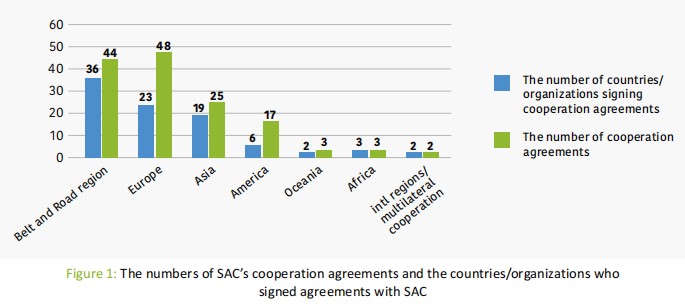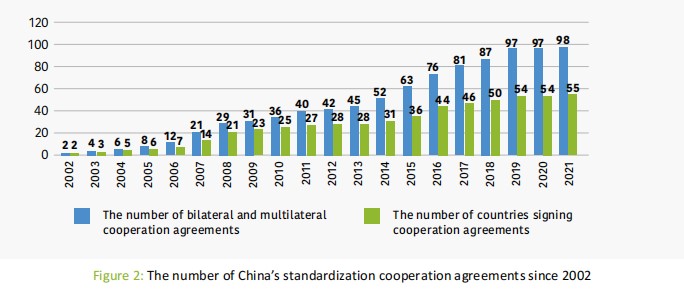


"The world needs the coordinated development of standards, as standards can promote the interconnectivity of the world." Just as what Chinese President Xi Jinping said, standard is the common language of the world, which is also the pass for international trade.
President Xi has attached great importance to standardization work and stressed for many times that we should facilitate innovative, coordinated, green, open and shared development by standards. On the first Belt and Road Forum for International Cooperation in 2017, Xi emphasized that it is important to promote the "soft connectivity" of policies, rules and standards.
Countries around the world have actively carried out standardization cooperation and exchanges to facilitate production capacity cooperation and exchanges on technology, economy and trade. With the international standardization cooperation agreement, standards can play a more helpful role in trade like reducing technical barriers, as mutually recognized standards become the technical foundation of bilateral business activities.
Since its establishment in 2001, the Standardization Administration of China (SAC) has actively conducted bilateral and multilateral cooperation and exchanges on standardization with international, regional and national standardization organizations and bodies. As of now, SAC has signed 98 bilateral and multilateral cooperation agreements with 55 international, regional standardization organizations and national standardization bodies.
Data tells everything
Up to now, SAC has signed cooperation agreements on standardization with partners from five continents, see Figure 1 and 2.


The significance of these agreements
Represent that the State values intl cooperation on standardization
China has highly valued international cooperation on standardization. Also, its state leaders have witnessed the signing of 13 bilateral or multilateral cooperation agreements. In particular, President Xi witnessed the signing of 6 standardization cooperation agreements with 4 countries such as France and Nepal.
Facilitate the establishment of bilateral and multilateral cooperation mechanism
Leaders of China, Japan and South Korea released the Joint Statement on China-Japan-South Korea Standardization Cooperation as early as in 2010, aiming to promote standardization cooperation in Northeast Asia. After that, the three countries held the Northeast Asia Standardization Cooperation Meeting each year, which has become the regular cooperation mechanism for the three parties.
Since 2011, SAC has also successively signed cooperation agreements to set up the China-Germany, China-France, China-UK standardization cooperation committees, promoting the pragmatic, effective standardization cooperation in many fields.
Promote the mutual recognition and adoption of Chinese and foreign standards
An important part of international standardization cooperation is to promote the compatibility of the Chinese and foreign standards systems and continue to improve the consistency of standards. To this end, when discussing cooperation with other countries, SAC always seeks to promote the mutual recognition and adoption of standards.
Up to now, 45 cooperation agreements signed with 38 countries have included the content of standard mutual recognition and adoption, e.g. the list of mutual recognition standards between China and the UK, the list of mutual recognition standards between China and France, the standardization cooperation agreement between China and Mongolia, etc.
Deepen standard cooperation with the countries along the Belt and Road
Standards also play a crucial role in the implementation of the Belt and Road Initiative. SAC has expanded the cooperation on standards with the countries along the Belt and Road in recent years, and signed 44 cooperation agreements with 36 countries like Kazakhstan, Mongolia, Singapore, Tajikistan and Armenia, facilitating the interconnectivity of policies, facilities and trade via standards.
In particular, at the first Belt and Road Forum for International Cooperation, SAC and 12 countries signed the Joint Initiative on Enhancing Standard Cooperation and Promoting the Construction of Belt and Road, writing a new chapter of the standard cooperation with these countries.
In the future, SAC is committed to establishing the partnership with more countries, implementing pragmatic effective cooperation, and making greater contributions to the international standardization community.
(Chinese version provided by International Cooperation Office of Standards Innovative Management Department, SAMR; edited and translated by Cao Xinxin)
供稿:标准创新司国际标准合作处;编译:曹欣欣